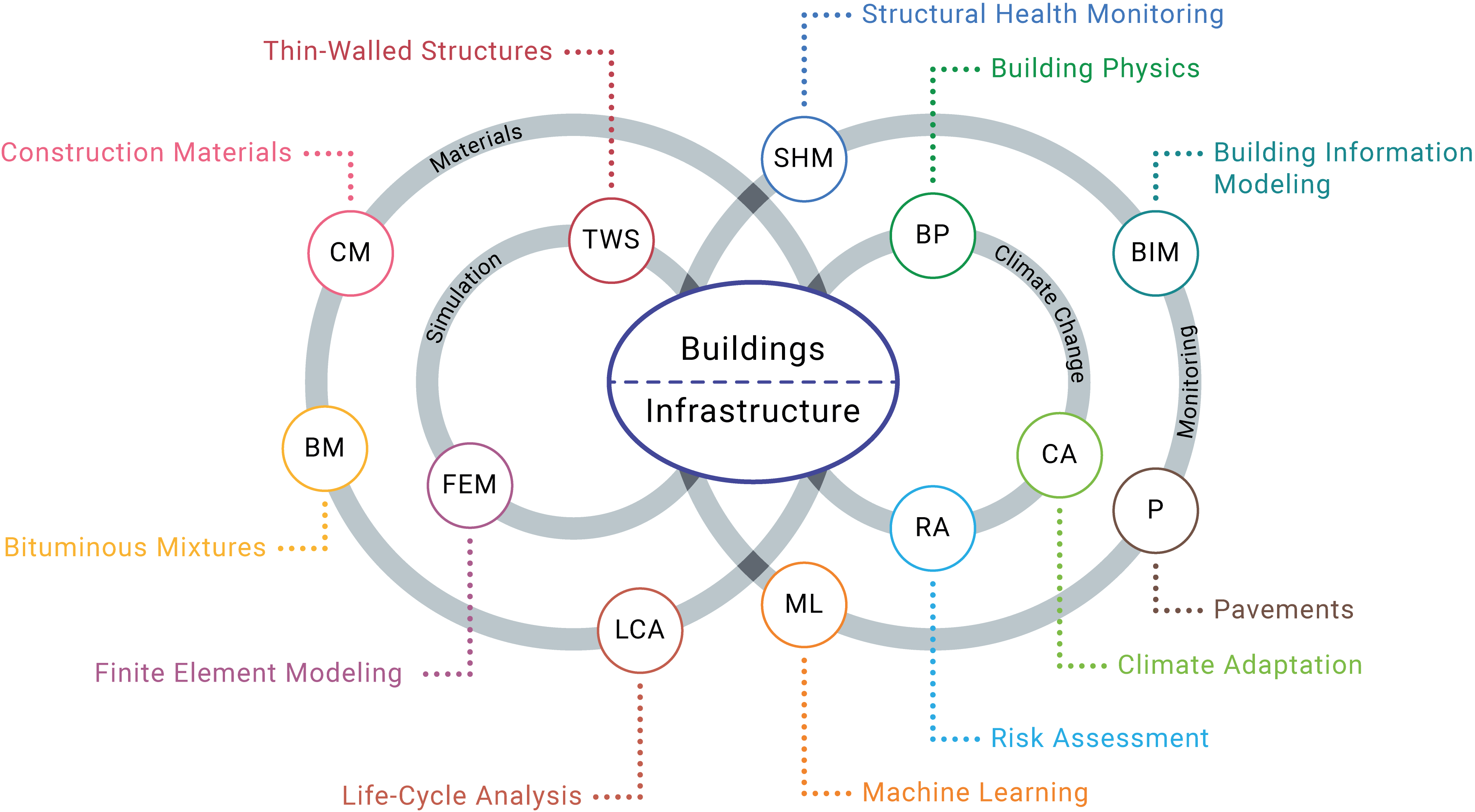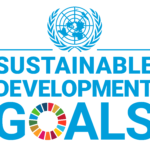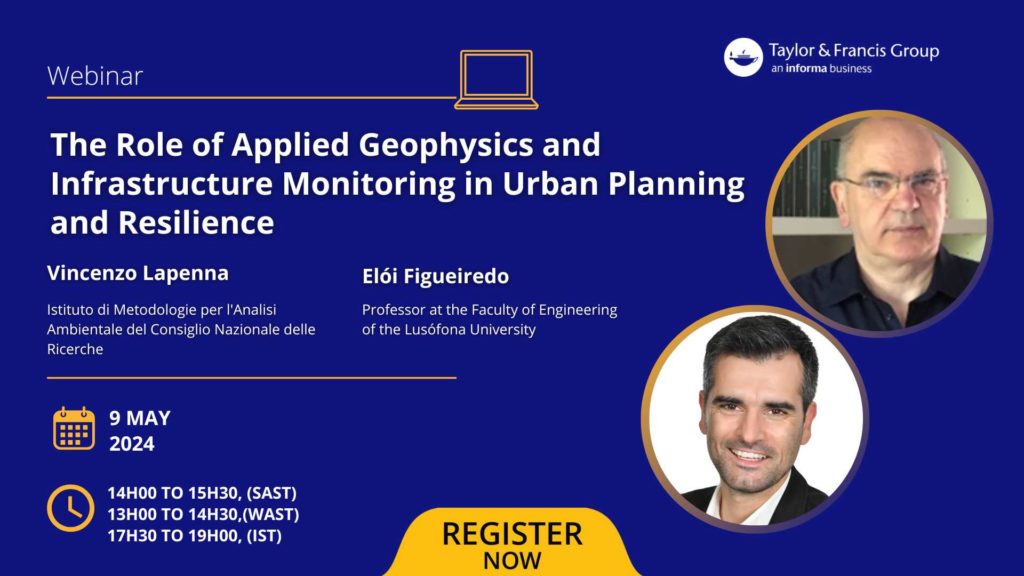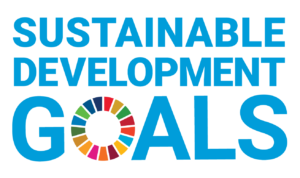IP3 – Development of solution to be adopted in the expansion of the IP3 rigid pavement
- Funding Institution IP – Infraestruturas de Portugal
- Coordinator Luís Quaresma (ULHT)
- Period of funding 2021
BuildingAdapt – Pioneer study to analyze the resilience of university buildings to climate change: ULHT campus
- Funding Institution COFAC
- Coordinator Guilherme Coelho (ULHT)
- Period of funding March 2021 to March 2023
Human beings spend more than 90% of their time inside buildings. Therefore, the characteristics of the indoor climate of these spaces have a substantial influence on the health and comfort of its occupants. Taking into account the expected changes in the outdoor climate in the near future, which invariably will affect the quality of the indoor climate, timely and considerate preparation of our buildings is necessary to minimize the consequences of climate change to our everyday life.
In order to anticipate the problems arising from this situation and since these changes can jeopardize the health and comfort of the occupants of the buildings, this project aims to study a set of measures that can be adapted by the ULHT buildings in order to be more resilient to climate change and, therefore, ensure an adequate indoor climate.
To this end, a non-destructive methodology will be used based on a two phased approach:
- Monitoring campaigns to determine the indoor temperature and relative humidity of the case studies, which will feed phase 2 with real-life measurements;
- Computational modelling of the case-studies and development of hygrothermal analyses, which take into account measurements from phase 1 and that will allow to thoroughly analyse the proposed measures, thus choosing the most appropriate ones to minimize the effects of climate change in the indoor climate of the case studies.”
QUANTI – Damage quantification in composite structures using artificial intelligence and numerical simulations
- Promoter Entity IST-UL, ULHT, UC, UNESP, UFMG and UFPA
- Coordinator Nuno Maia (IST-UL) and Samuel da Silva (UNESP)
- Funding Institution FCT/CAPES (2019.00164.CBM)
- Coordinators per institution involved Nuno Maia (IST-UL), Elói Figueiredo (ULHT), João Pedro Martins (UC), Samuel da Silva (UNESP), Carlos Cimini Junior (UFMG), João Weyl (UFPA).
- Period of funding March 2021 to March 2023
App4SHM – Smartphone application for structural health monitoring
Development of a smartphone application to monitor the structural health of buildings and special structures (like bridges) after catastrophic events.
This application will be able to interrogate the phone’s internal sensors, or other paired devices via Bluetooth or USB, and to analyze and compare the data collected through intelligent algorithms properly trained in order to detect damage and quantify the structural risk in real time. As it is a mobile application with access to a server, it is possible to create a networked system of several nodes through the simultaneous use of several smartphones.
This is a R&D project funded by COFAC and involving students and professors from ULHT’s civil engineering and computer science courses: Eloi Figueiredo, Hugo Rebelo, Ionut Moldovan, Luís Silva, Nuno Penim, Paulo Oliveira, Pedro Alves.
ClimaBridge – Impact of climate change on the structural health of bridges
- Promoter Entity COFAC – Lusófona University
- Coordinator Eloi Figueiredo (ULHT)
- Funding Institution EEA Grants
- Partners Oslo Metropolitan University (OsloMet), Infraestruturas de Portugal (IP) and Laboratório Nacional de Engenharia Civil (LNEC)
- Period of funding March 2021 to March 2023
- Website climabridge.ulusofona.pt
Reconhecer Project
- Coordenador Elói Figueiredo (ULHT) e Luís Oliveira Santos (LNEC)
- Starting April 2019
A Câmara Municipal vai inventariar pontes, viadutos, túneis, passagens superiores, passagens inferiores e passagens hidráulicas existentes no concelho de Barcelos, e que estejam sob a sua responsabilidade direta, tendo em vista a realização de intervenções que se venham a mostrar necessárias à segurança de pessoas e bens. Para o efeito, o executivo municipal aprovou a implementação projeto “Reconhecer”, desenvolvido pela Universidade Lusófona (ULHT) e pelo Laboratório Nacional de Engenharia Civil (LNEC) de Lisboa, através de protocolo envolvendo as três entidades. Segundo o documento aprovado pelo executivo é possível não só potenciar a definição de uma estratégia de acompanhamento das condições das obras de arte mas, também, facilitar a orçamentação da sua manutenção e posicionar o Município de Barcelos como uma das autarquias a implementar um plano de inventariação das obras de arte sob a sua responsabilidade direta e, assim, promovendo uma maior proteção permanente de vidas humanas.
Projeto – Utilização de fibras INNOCELL FG3000 em misturas do tipo Stone Mastic Asphalt (SMA)
- Coordenador Luís Quaresma (ULHT)
- Starting October 2018
No âmbito do Mestrado em Engenharia Civil, da Faculdade de Engenharia, da Universidade Lusófona Humanidades e Tecnologias, e das atividades de investigação do DREAMS, está em desenvolvimento o projeto Utilização de fibras INNOCELL FG3000 em misturas do tipo Stone Mastic Asphalt (SMA).
Este trabalho visa a avaliação do comportamento de misturas do tipo Stone Mastic Asphalt (SMA) utilizando fibras de celulose com ceras poliolefínicas, incluindo a aplicação destas misturas em trecho experimental incluído na rede rodoviária nacional.
O trabalho é financiado pela empresa RAVAGO CHEMICALS SPAIN, S.A e inclui a cooperação com a Infraestruturas de Portugal.


 This group contributes to the Sustainable Development Goal (SDG) 9 and related SDGs 12 and 13, by promoting sustainable and resilient infrastructure through the introduction of new technologies, materials, and innovation intended to facilitate efficient use of resources and guarantee the safety and comfort of people.
This group contributes to the Sustainable Development Goal (SDG) 9 and related SDGs 12 and 13, by promoting sustainable and resilient infrastructure through the introduction of new technologies, materials, and innovation intended to facilitate efficient use of resources and guarantee the safety and comfort of people.


 Have a look at
Have a look at 